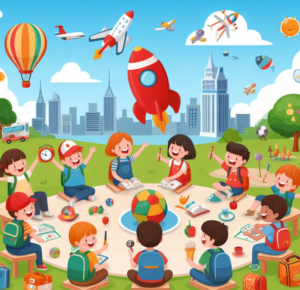Field trips are an exceptional method for promoting hands-on learning, taking learners away from traditional classroom settings and immersing them in active participation with the subject matter. When students visit places like museums, historical sites, or science centers, they interact directly with the objects and concepts they’ve learned about in class. This engagement brings textbook knowledge to life, allowing learners to make meaningful connections between what they’ve studied and the world around them.

When biology students visit a nature reserve, they observe ecosystems firsthand, engaging with the environment in a way that enriches their understanding of the subject matter. Such experiences are often impossible to replicate in a regular classroom setting. Experiencing the natural world allows learners to observe life cycles, biodiversity, and ecological interactions up close, which can strengthen their grasp of biological concepts.
These educational excursions also have the potential to inspire students to delve into subjects more thoroughly. The enthusiasm for learning sparked by these experiences can extend well beyond the field trip itself, influencing students’ further education and career paths. The benefits of these outings extend to accommodating diverse learning preferences as well. Students with visual, auditory, or kinesthetic learning styles can engage with the material in a manner that suits them best, thus enhancing the educational experience for everyone.
Field trips offer teachers a unique platform to evaluate their students’ learning in a different environment. Observing how students interact with and respond to real-world applications of their studies provides educators with insights that can inform future teaching strategies. The direct feedback and observational data gathered during field trips can be invaluable for adapting teaching methods to meet the needs of all students.
Educators and school systems should recognize the significant benefits that field trips provide and consider integrating these experiences into the curriculum routinely. By doing so, they foster a more dynamic, interactive, and inclusive learning environment that can significantly enhance educational outcomes. Field trips are more than just educational outings; they are a vital component of a comprehensive learning experience that helps prepare students for life beyond the classroom.
Contribution of Field Trips to Cognitive Development
The role that field trips play in the cognitive development of children cannot be overstated. These excursions offer a rich, educational experience that goes beyond memorizing information. Field trips engage students by pushing them to employ critical thinking and problem-solving abilities in new and often challenging environments. When students, for example, visit a historical battlefield, they delve deeper into understanding the historical context, analyzing the causes and consequences of events, examining tactics employed in warfare, and gaining insights into subsequent societal shifts.
In addition to the immediate hands-on learning opportunities, field trips are particularly effective in creating cross-curricular links. An example of this is art students exploring impressionist works at a gallery, where they can relate the artwork to historical occurrences and literary works from the same period. These connections are instrumental in developing a well-rounded understanding of various subjects, as they illustrate the interconnected nature of different areas of knowledge, breaking the barriers of compartmentalized learning.
Field trips also serve to enhance observational skills among students. By focusing on the little details within their environment or at exhibits, children learn to sharpen their focus and develop an enhanced attention to detail. These skills are invaluable and easily transferable, beneficial for other academic tasks including classroom activities and exams.
The firsthand experiences afforded by field trips can ignite a student’s interest and enthusiasm for a subject, leading to a more engaged and curious mindset. This heightened engagement can promote a love for lifelong learning, as students connect their experiences with real-world applications of knowledge. The informal settings of field trips often lead to increased discussion among peers, promoting social skills and the ability to work within a team.
Encouragement from teachers and engagement with experts during field trips can also help students recognize their potential and interests. This recognition can guide future academic and career choices, making field trips a fundamental component of education that aids in shaping a student’s future. As students continue to develop intellectually, the lessons learned from these trips enhance their ability to think critically about the world around them, preparing them for the complexities of modern society.
Building Interpersonal Skills on Field Trips
Field trips are a dynamic aspect of educational programs that bolster student learning and development. Educational excursions extend beyond the bounds of classroom instruction by fostering essential interpersonal skills in students. These outings require students to engage with their peers actively, collaborate in group settings, and navigate various social dynamics, all of which are integral to their overall educational experience.
During these trips, children might find themselves solving problems together, such as working out clues on a scavenger hunt at a historical site. This team-based problem-solving promotes effective communication, encourages students to practice teamwork, and provides insight into the nuances of group work. These experiences are fundamental to building cooperative skills and enhancing a student’s ability to function within a team.
Engagement with the broader community is another significant opportunity presented by field trips. When students step out of their usual environments, they encounter guides, subject matter experts, and other community members. Interactions with this diverse range of individuals expose students to different perspectives and social situations. This exposure is invaluable in developing social skills, teaching students about social norms, and integrating polite, respectful engagement with new individuals into their behavioral repertoire.
The collective nature of these experiences serves to solidify bonds among peers. As students share in the thrill of discovery and adventure, they cultivate lasting connections. The joy and camaraderie found in shared learning experiences frequently become indelible memories, laying the foundation for enduring friendships.
Educational outings are exceedingly beneficial. They offer stimulation on multiple levels, enrich academic concepts with experiential learning, and nurture the socio-emotional growth critical to a student’s development. Schools that provide consistent opportunities for field trips demonstrate a commitment to a comprehensive educational approach. They recognize the role that these experiences play in shaping adaptive, knowledgeable, and socially capable individuals. This recognition is affirmed by the integration of such trips into the curriculum, reflecting the belief in a holistic approach to education wherein life skills are given just as much importance as academic knowledge.

